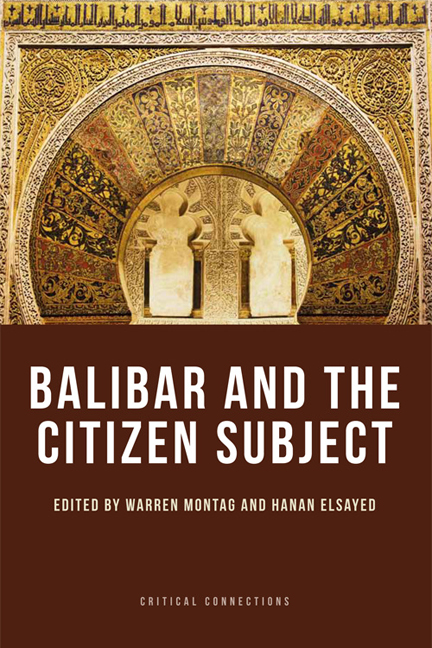Book contents
- Frontmatter
- Contents
- Introduction: Balibar and the Citizen Subject
- Part I Balibar Reading Schmitt Reading Hobbes: Equality or Similitude?
- 1 Schmitt's Hobbes, Hobbes's Schmitt
- 2 The Mortal God and his Faithful Subjects: Hobbes, Schmitt and the Antinomies of Secularism
- Part II Transindividual/Universal
- Part III Inequality, Violence and the Possibility of Citizenship
- Notes on Contributors
- Index
2 - The Mortal God and his Faithful Subjects: Hobbes, Schmitt and the Antinomies of Secularism
from Part I - Balibar Reading Schmitt Reading Hobbes: Equality or Similitude?
Published online by Cambridge University Press: 10 January 2018
- Frontmatter
- Contents
- Introduction: Balibar and the Citizen Subject
- Part I Balibar Reading Schmitt Reading Hobbes: Equality or Similitude?
- 1 Schmitt's Hobbes, Hobbes's Schmitt
- 2 The Mortal God and his Faithful Subjects: Hobbes, Schmitt and the Antinomies of Secularism
- Part II Transindividual/Universal
- Part III Inequality, Violence and the Possibility of Citizenship
- Notes on Contributors
- Index
Summary
The preface I wrote in 2002 for the French translation of Schmitt's book, The Leviathan in the State Theory of Thomas Hobbes, published by Éditions du Seuil, had already become so long that I was unable to include as I had originally intended a section entitled “God's Impotence” (“L'impuissance de Dieu”), concerning the doctrine of the Katechon. For this reason, I had to set it aside. I wanted to take advantage of the opportunity offered to me here to return to this theme. The conjuncture is no longer entirely the same. It is overdetermined in particular by the resumption of the debates over the meaning of “secularism” and the modalities of its application in the French context (à la française). The legal projects in preparation at that time concerning the prohibition against the wearing of the burka or the niqab in what were called “public spaces,” a category that seemed to designate any place from which a third-party was not excluded, showed quite clearly the extremities to which this category could lead when it was considered not only a constitutive element of the sovereignty of the state, but as the principle source of the legitimacy of its republican form. But it is always in the urgency of the conjuncture that we identify the point of the question that must be posed to the classical texts to determine what, even today, gives their theoretical statements their vitality.
Inversely, there is little doubt, on the one hand, that the Hobbesian conception of the separation of Church and State with the fluctuations that may include its institutional realization, but also the intransigence of the principled position of which it is the incarnation, constitutes the typical “source” of the French doctrine of a secularism of the state or, if you prefer, of secularism as an attribute of public power, that lies at the heart of the classical doctrine of ius circa sacra, developed in different ways by Locke and Spinoza.
- Type
- Chapter
- Information
- Balibar and the Citizen Subject , pp. 94 - 108Publisher: Edinburgh University PressPrint publication year: 2017



